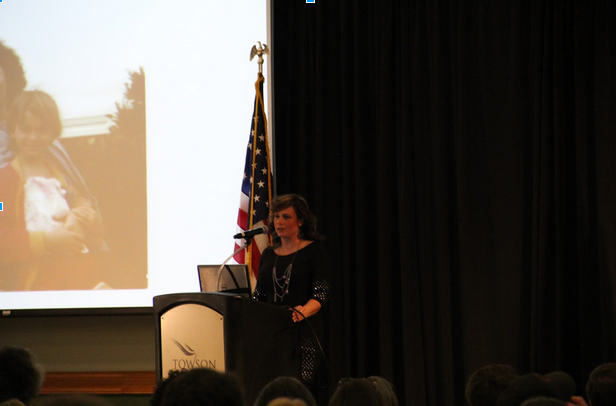TOWSON — Alana Johnson, a mother of five, said she was stunned when she realized that child sex-trafficking was possible right in her community.
“I was blind to the fact that it’s right here,” she said. And that is why she volunteered to work Saturday at the Maryland Freedom Conference at Towson University.
“We want to make people mindful that this is happening to our sons and daughters,” Johnson said, as she stood at a table for the Araminta Freedom Initiative, a Baltimore anti-trafficking organization. “It can reach into any home, any background, any socioeconomic class you can think of.”

A coalition of government agencies and anti-trafficking organizations sponsored the public education forum for a crowd of about 400 in an effort to combat a problem they say is prevalent in Maryland.
A lobbying day planned for February 11 in Annapolis is the next big event for The Maryland Human Trafficking Task Force, one of the conference sponsors, to push for anti-trafficking legislation.
Maryland is a magnet for labor and sex trafficking of children and adults, in part because of the many interstate highways, abundance of tourism and international institutions, weak human trafficking laws and general lack of awareness, said Amanda Rodriguez, manager of domestic violence and human trafficking policy for the Maryland Governor’s Office of Crime Control and Prevention, another conference sponsor.
“We felt that it was time to start educating the public,” said Rodriguez, a former human trafficking prosecutor in Baltimore County. “The community is the eyes and ears of this issue.”
Human trafficking is the use of force, fraud, or coercion to compel someone to work or to commit commercial sex acts — and investigations often begin with neighborhood complaints about a house or business, Rodriguez said.
“It is absolutely imperative that the public be made aware of the crime that is literally happening next door.”
The conference was attended by police officers and social workers who investigate human trafficking, representatives of organizations that help victims and members of the public.
“We came so we can equip ourselves and our kids to be more sensitive to the issue,” said Alton Carter, a member of New Vision Church in Bowie, who went to the conference to gather information to pass on to the church’s young adult program.
Other conference sponsors included the Baltimore County Human Relations Commission and The Baltimore County Commission for Women.
“We’d like to do this event every year and we’re hoping the people who attended can take these issues further,” said Bella Owens, president of the county women’s commission. In Annapolis, the groups will be lobbying for two pieces of legislation.
One new bill would make trafficking a defense against charges such as prostitution. The other bill would establish a state-level work group to explore whether Maryland should have a safe harbor law, said Jerry Kickenson, member of the Maryland Human Trafficking Task Force’s legislative subcommittee.
Safe harbor laws aim to treat children who engage in commercial sex as victims rather than prosecuting them as criminals.
The state task force was formed in 2007 by the Maryland attorney general and the Baltimore state’s attorney to coordinate the prosecutorial, investigative and victim and survivor services across the state of Maryland, according to its website. It is made up of representatives of federal, state and local agencies and anti-trafficking organizations.


You must be logged in to post a comment.